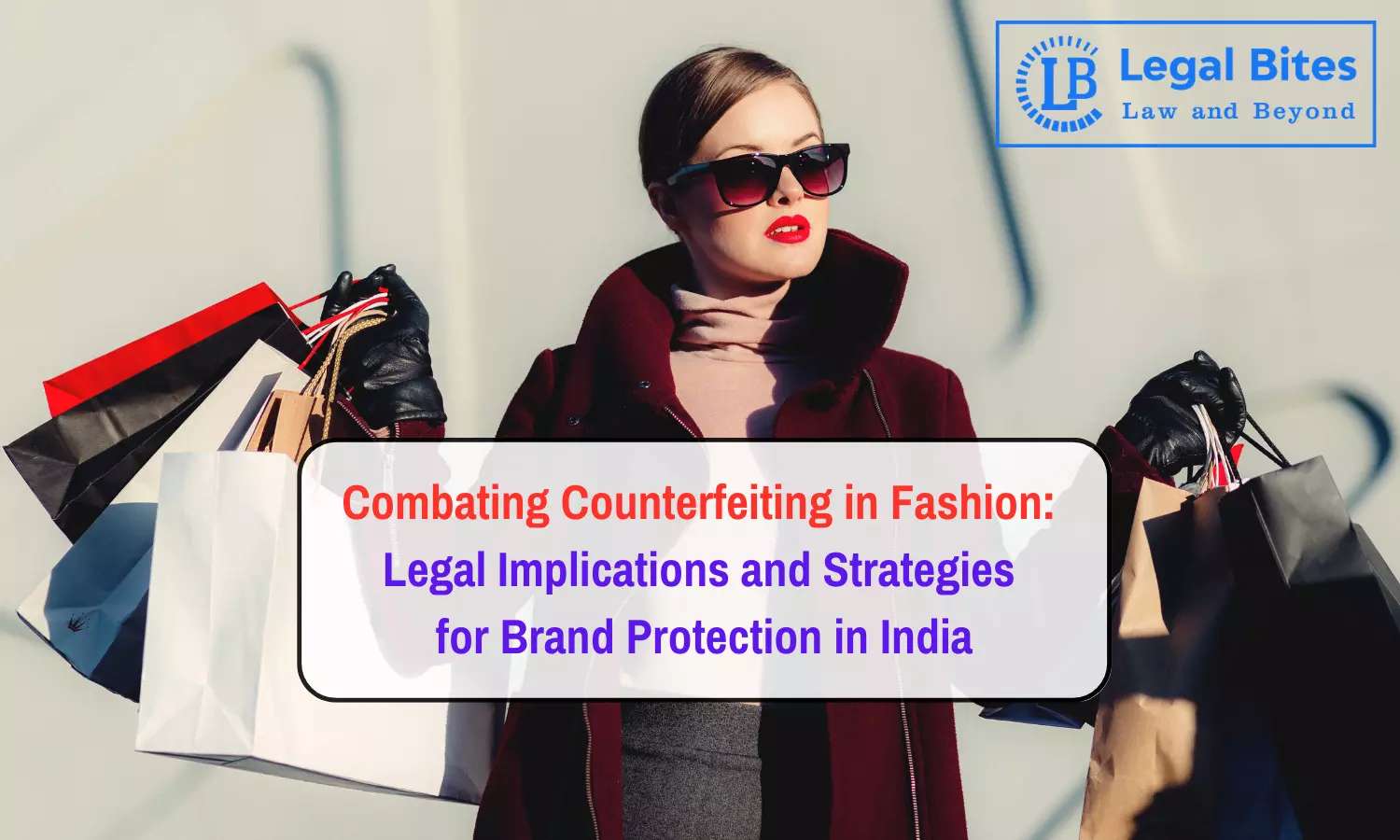Combating Counterfeiting in Fashion: Legal Implications and Strategies for Brand Protection in India
The article 'Combating Counterfeiting in Fashion: Legal Implications and Strategies for Brand Protection in India' highlights the legal implications of Counterfeiting in Fashion, effective steps for brand protection, and a few case laws.

The article 'Combating Counterfeiting in Fashion: Legal Implications and Strategies for Brand Protection in India' highlights the legal implications of Counterfeiting in Fashion, effective steps for the protection of a brand, along with a few case laws.
Counterfeiting in the fashion industry has been a growing concern in recent years, not just in India but globally. Counterfeiting is the act of producing and selling goods that are identical or substantially similar to genuine products, without authorization or permission from the legitimate owner of the trademark. Counterfeiters often target popular and high-end brands to take advantage of their reputation and customer base. Counterfeiting can have severe legal and economic consequences for the brand owners, as well as the consumers who unknowingly purchase counterfeit goods.
Legal Implications of Counterfeiting in Fashion
Counterfeiting in the fashion industry can lead to a number of legal implications for both brand owners and consumers. Some of the legal implications of counterfeiting in fashion include:
1. Infringement of Intellectual Property Rights: Counterfeiting in the fashion industry involves the unauthorized use of trademarks, designs, and copyrights, which infringes the intellectual property rights of the legitimate owner of the brand. Under Indian intellectual property law, trademark infringement can result in civil and criminal liability, including damages and imprisonment.
2. Unfair Competition: Counterfeiting in the fashion industry can lead to unfair competition, as counterfeiters can sell their products at lower prices, taking away market share from legitimate brands. This can lead to a loss of revenue and reputation for legitimate brand owners.
3. Consumer Health and Safety: Counterfeit products in the fashion industry are often of poor quality and can pose a health and safety risk to consumers. Counterfeit cosmetics, for example, can contain harmful chemicals that can cause skin irritation, allergies, and other health problems.
Steps that Brands can Take to Protect Themselves from Counterfeiters
There are several steps that fashion brands can take to protect themselves from counterfeiters. Some of the steps include:
1. Registering their Trademarks: Trademark registration is an effective way for fashion brands to protect their intellectual property rights and prevent counterfeiting. The Trademarks Act, 1999 governs trademark registration in India. A registered trademark provides legal protection to the brand owner and can be enforced through civil and criminal proceedings.
2. Conducting Market Surveillance: Fashion brands can conduct regular market surveillance to identify counterfeit products and take legal action against the counterfeiters. In India, the Customs Act, 1962, empowers the customs authorities to seize and detain goods suspected of infringing intellectual property rights.
3. Educating Consumers: Fashion brands can educate consumers about the risks of purchasing counterfeit products and the benefits of buying genuine products. This can help consumers make informed choices and avoid purchasing counterfeit products.
4. Use Anti-Counterfeiting Technologies: Brands can use anti-counterfeiting technologies such as holograms, watermarks, and QR codes on their products to make it difficult for counterfeiters to copy them.
Case Laws and Provisions
Several case laws and provisions support the claim that counterfeiting in the fashion industry can have severe legal consequences. The Indian judiciary has dealt with several cases related to counterfeiting in the fashion industry. In Christian Louboutin SAS v. Nakul Bajaj and Ors.[1] , the Delhi High Court held that the sale of counterfeit products by Christian Louboutin infringed the trademark rights of the brand. The court granted an interim injunction to the brand, which prevented the defendants from selling any counterfeit products of the brand.
In addition to Indian laws, several international laws and agreements also provide legal protection against counterfeiting. The Agreement on Trade-Related Aspects of Intellectual Property Rights (TRIPS) is an international agreement that sets out minimum standards for the protection and enforcement of intellectual property rights. The TRIPS agreement provides legal protection to trademarks and other forms of intellectual property and provides for civil and criminal remedies against infringers.
Under United States law, the Lanham Act provides for civil remedies, including injunctions, damages, and accounts of profits for trademark infringement. In the case of Louis Vuitton Malletier SA v. Akanoc Solutions, Inc.[2], the court held that the defendant's website, which hosted counterfeit products of Louis Vuitton, infringed the trademark rights of the brand.
Conclusion
Counterfeiting in the fashion industry is a serious problem that has legal implications for fashion brands. Indian intellectual property law provides for criminal and civil remedies to protect brands from counterfeiters. Fashion brands can take several steps, including registering their trademarks and designs, conducting regular market surveys, collaborating with law enforcement agencies, and using anti-counterfeiting technologies to protect themselves from counterfeiters. By taking these steps, fashion brands can safeguard their intellectual property rights and prevent harm to their brand reputation and sales.
References
[1] CS(COMM) 344/2018
[2] No. C07-03952 JW
Important Links
Law Library: Notes and Study Material for LLB, LLM, Judiciary, and Entrance Exams

